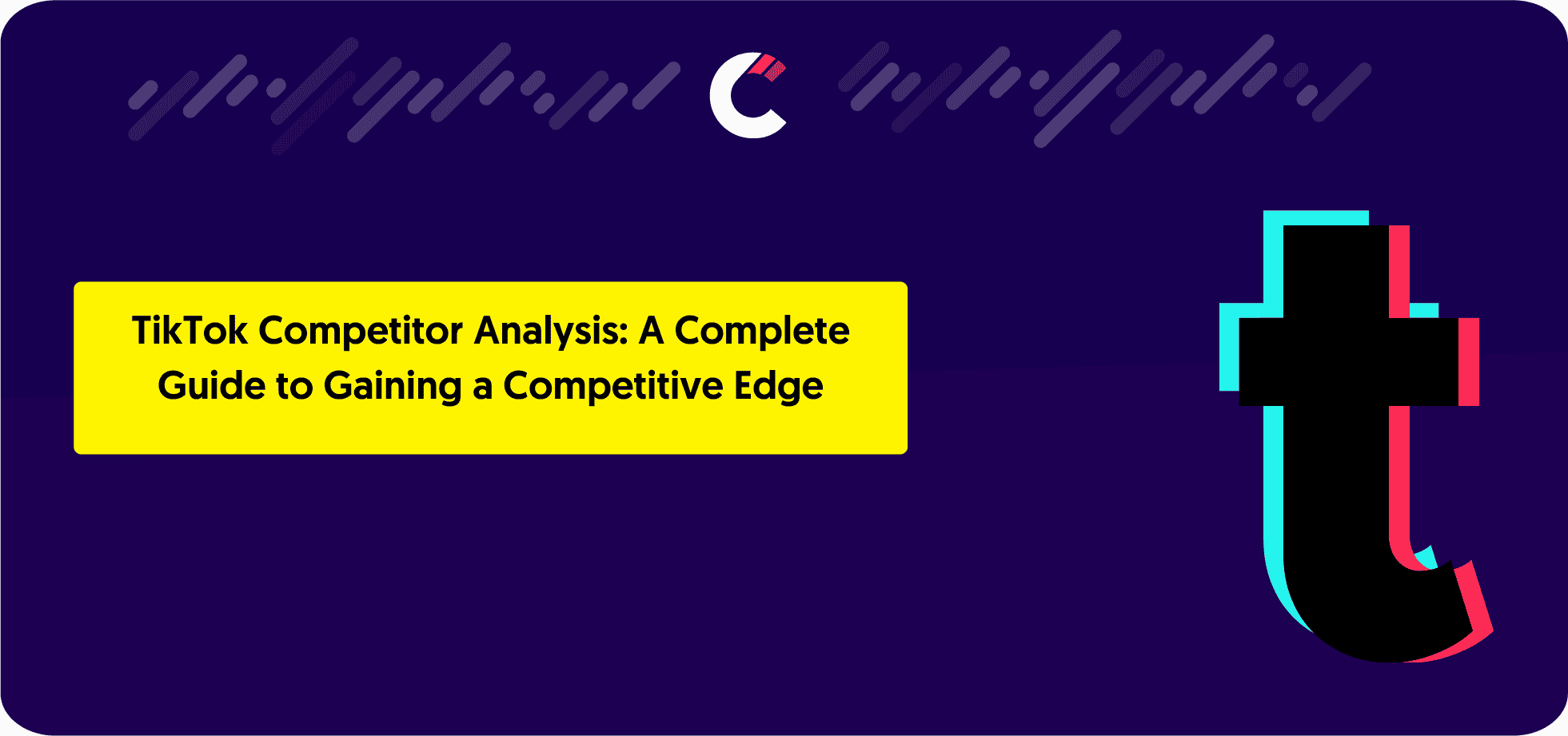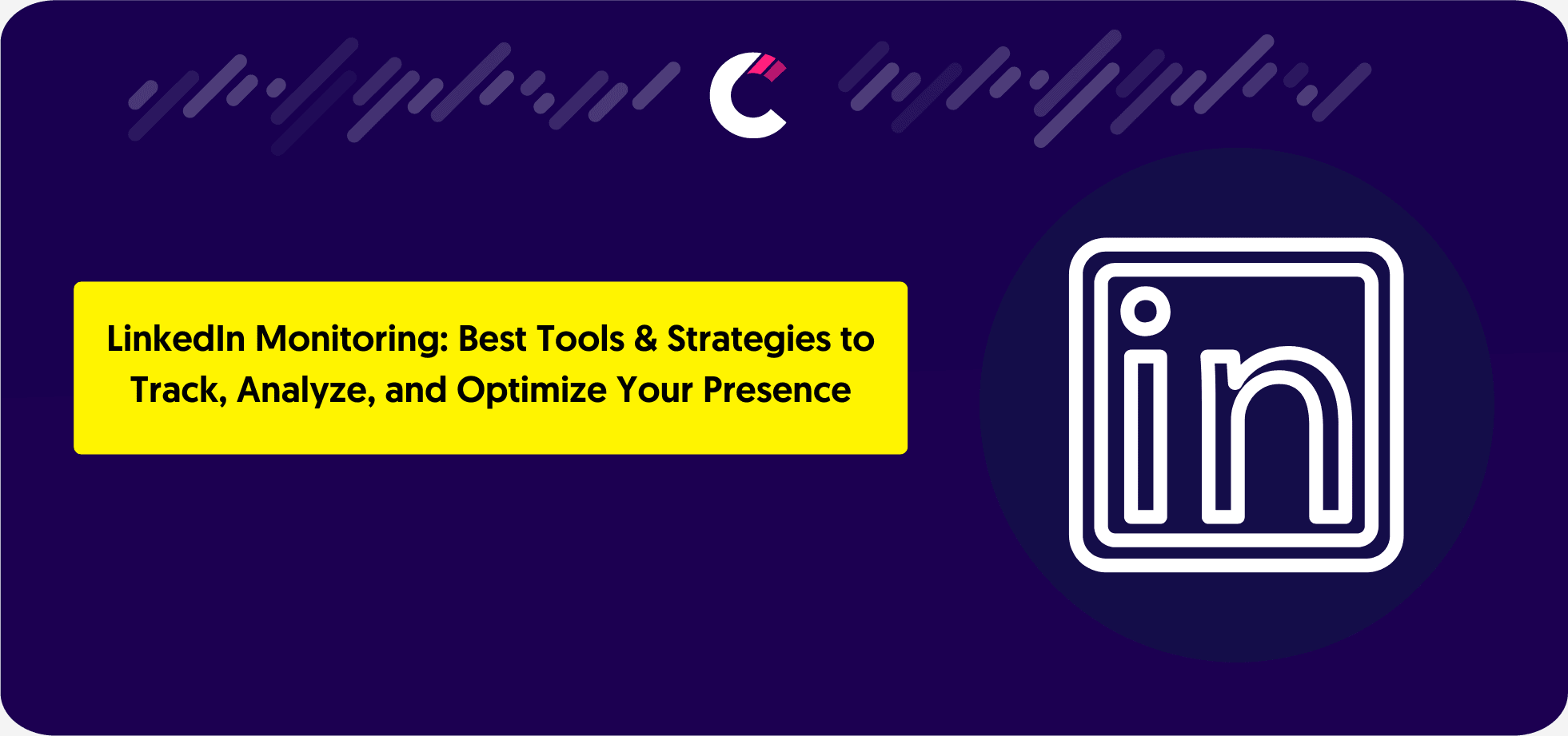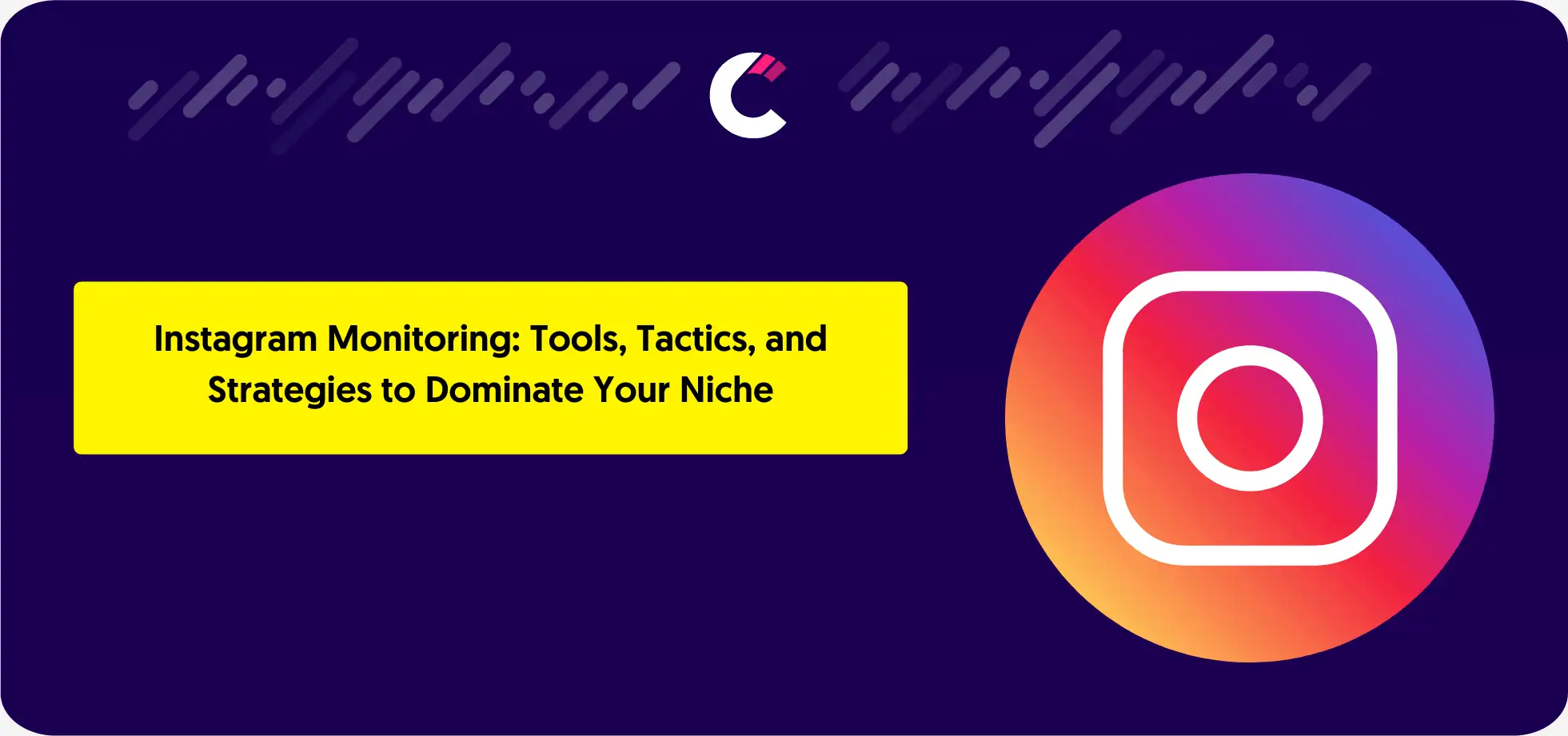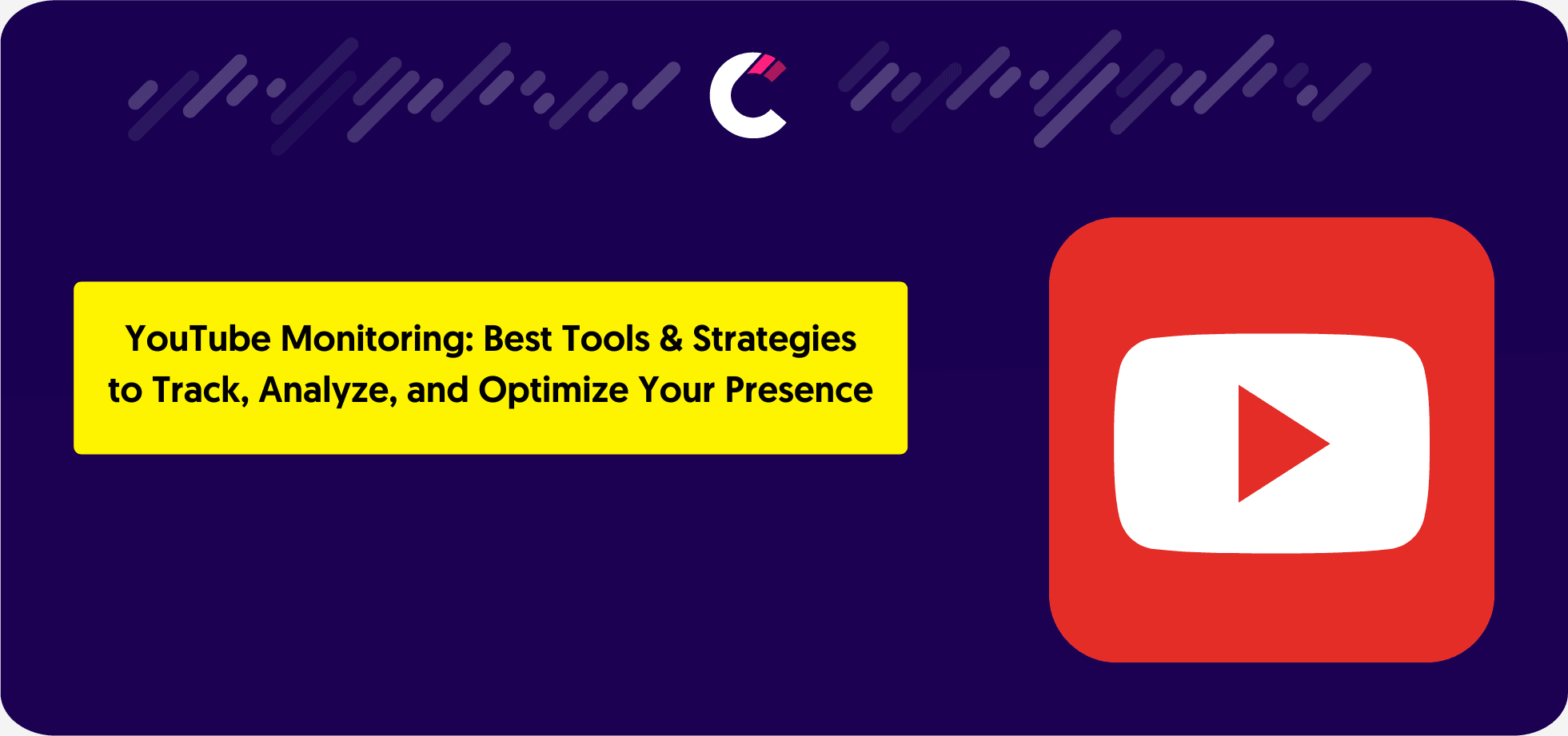What is TikTok Competitor Analysis?
TikTok competitor analysis is the process of evaluating the strategies, performance, and content of other brands or creators within your niche on TikTok. By closely monitoring your competitors’ activities, you can gain insights into what’s working for them, identify opportunities for differentiation, and uncover trends that might be relevant to your audience.
This analysis goes beyond simply observing follower counts; it goes into engagement rates, content types, and audience behaviours, offering a roadmap for your own TikTok strategy.
Understanding competitor analysis on TikTok is crucial for any brand looking to grow. With TikTok’s algorithm-driven platform, staying ahead requires a data-driven approach to content creation and audience engagement. By identifying what competitors are doing right—and wrong—you can fine-tune your strategy to attract more followers, improve engagement, and ultimately drive business results.
Why Should You Do a Competitor Analysis on TikTok?
Helps Refine Your Content Strategy
Analysing your competitors’ TikTok strategies helps you understand what resonates with audiences. By observing their video formats, themes, and posting schedules, you can identify best practices and align your content for maximum engagement. For example, if shorter videos perform better for a competitor, you can test similar formats while maintaining your unique style. This ensures your strategy is informed by data, not guesswork.
Identifying Opportunities to Build a Stronger TikTok Presence
TikTok competitor analysis uncovers gaps your competitors might be missing. For instance, they may not be using emerging features like Stories or interactive Q&As. Capitalising on these opportunities helps you differentiate your content. Additionally, identifying underutilised hashtags can improve visibility and attract new viewers.
Enhancing Audience Engagement Through Competitor Insights
Competitor insights reveal what drives engagement, such as effective call-to-actions or popular content themes. Analysing how competitors respond to comments or use features like duets offers actionable ideas to boost interactions. Incorporating these techniques strengthens your connection with your audience, leading to better engagement rates.
How to Analyze Your Competition Using Our Free TikTok Competitor Analysis Tool
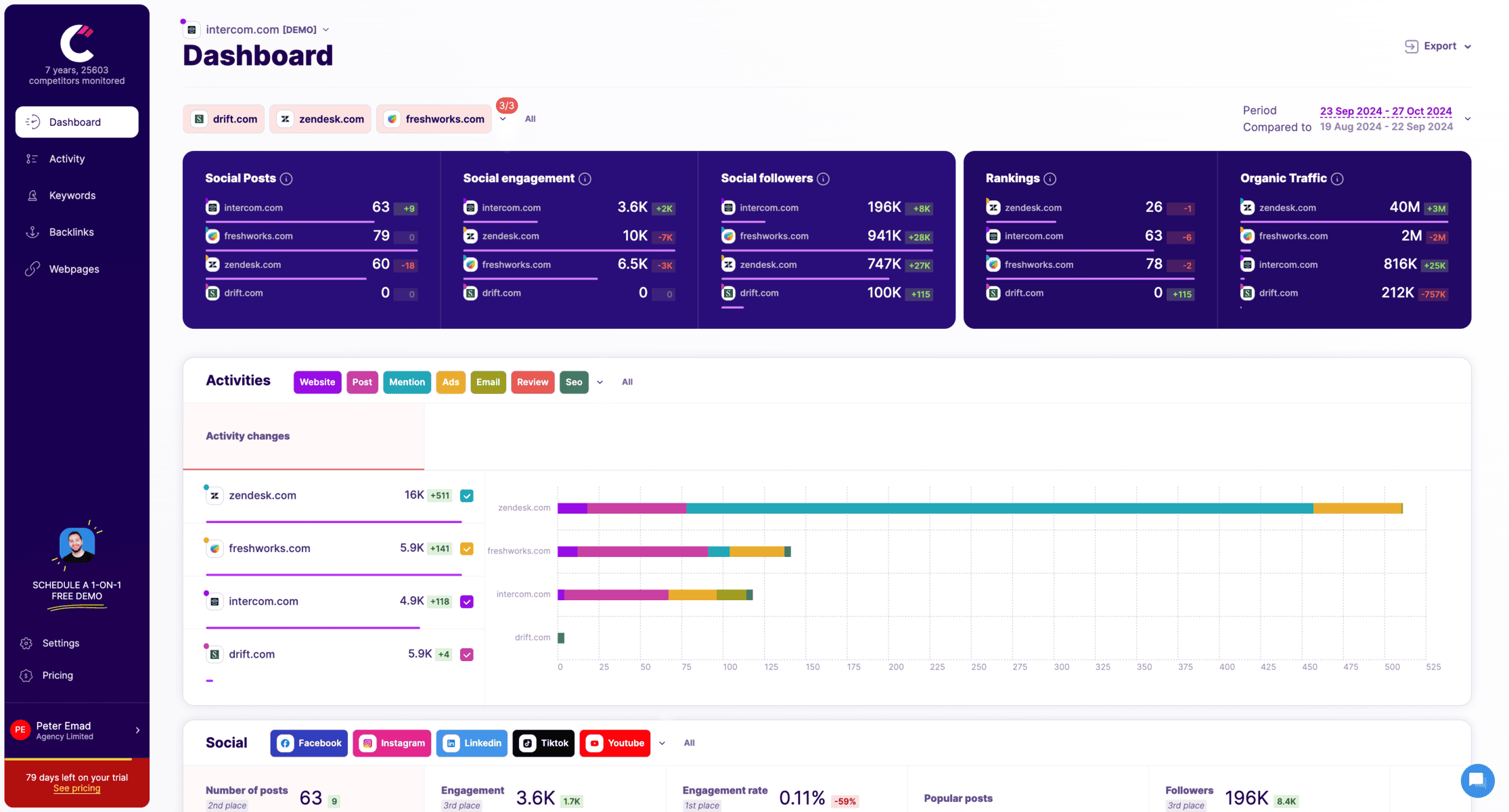
Conducting a social media competitive analysis can be streamlined and efficient with the use of Competitors App that helps you track social media pages easily. . Here’s how to do it:
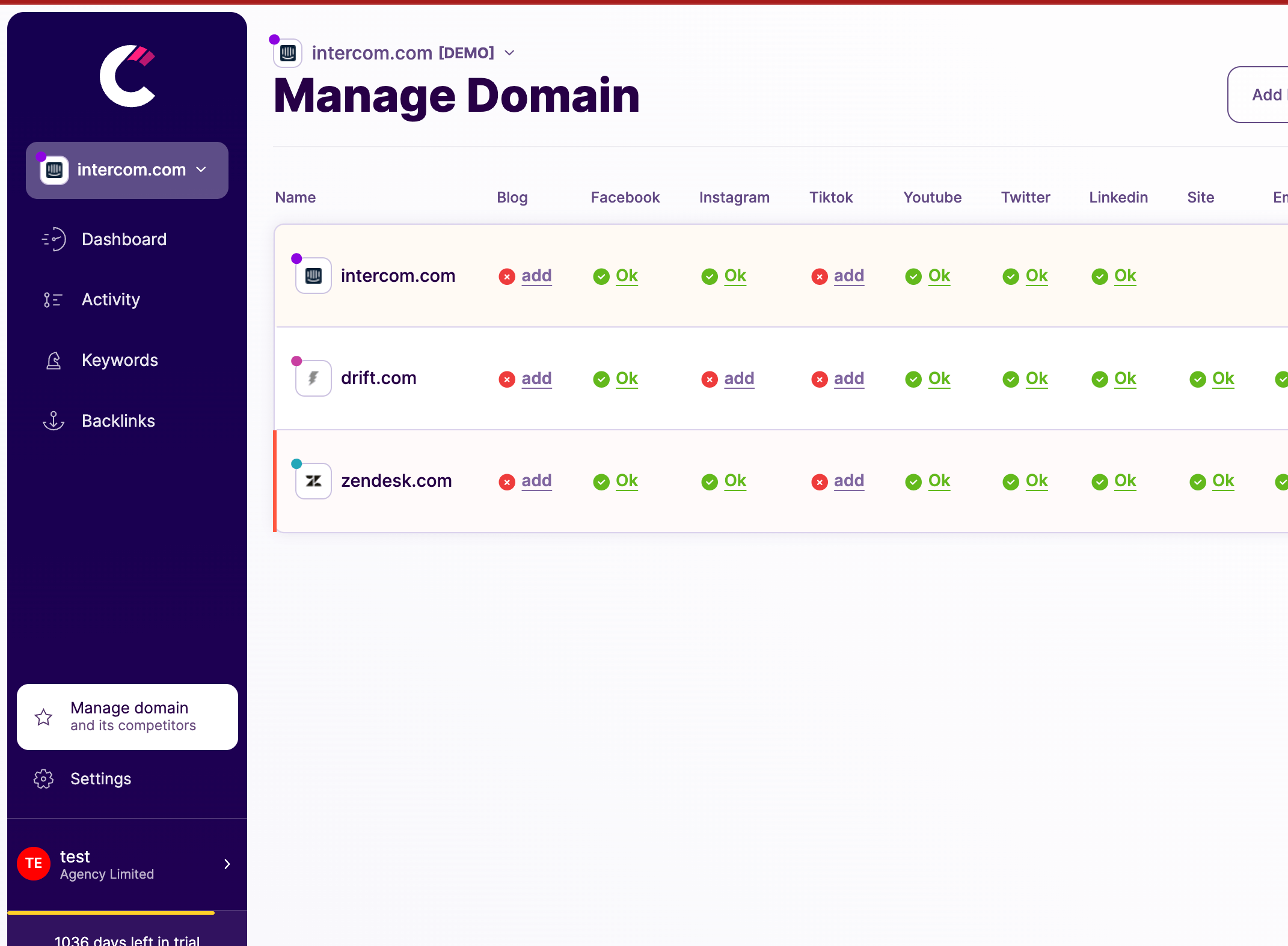
Step 1: Identify Your Competitors
The first step is to identify who your direct and indirect competitors are. These are the businesses that are vying for the same audience as you.
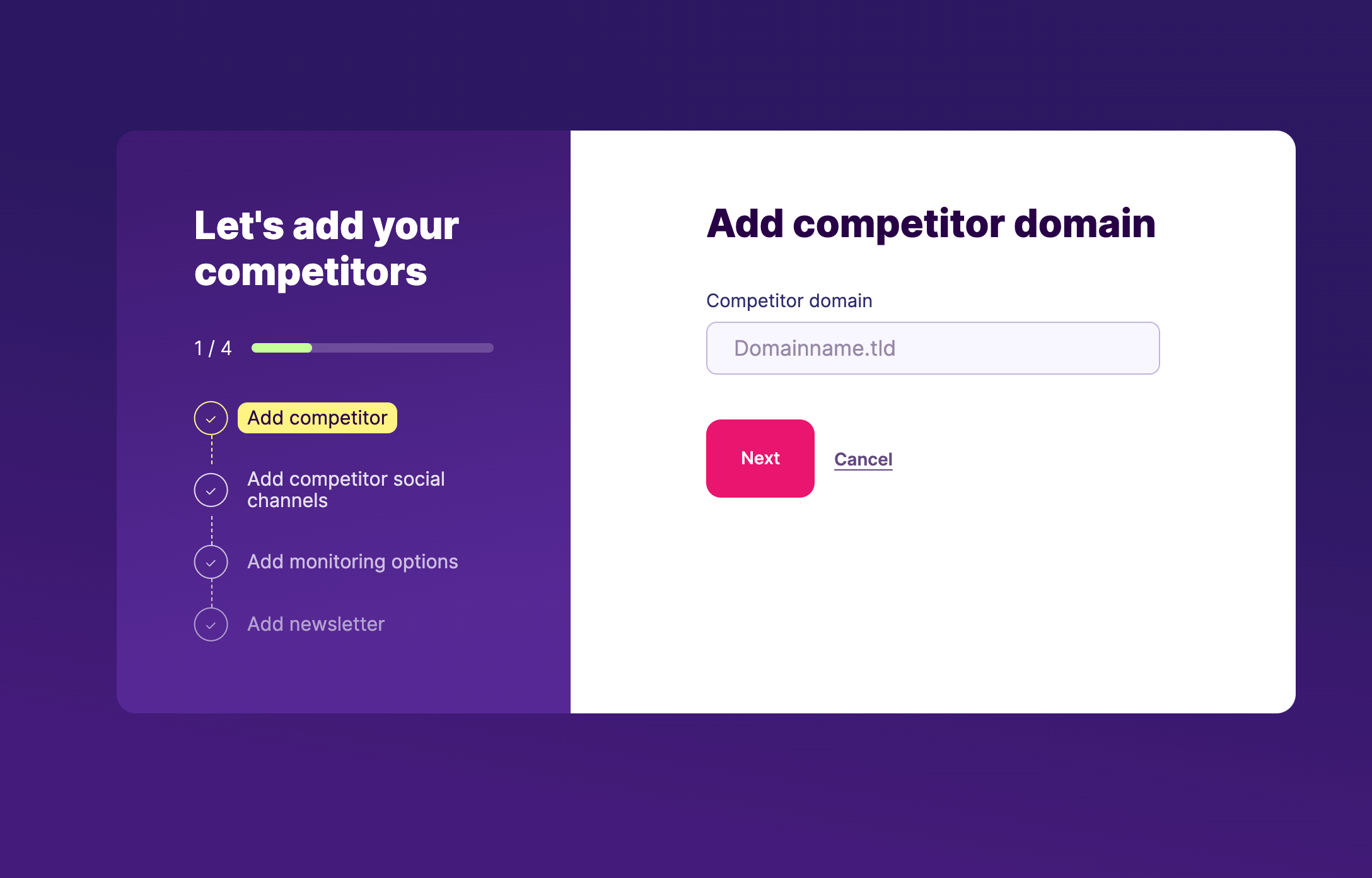
Step 2: Add Your Competitors
Once you have a list of your competitors, add them to Competitors App. This is a straightforward process that allows you to begin tracking their activities.
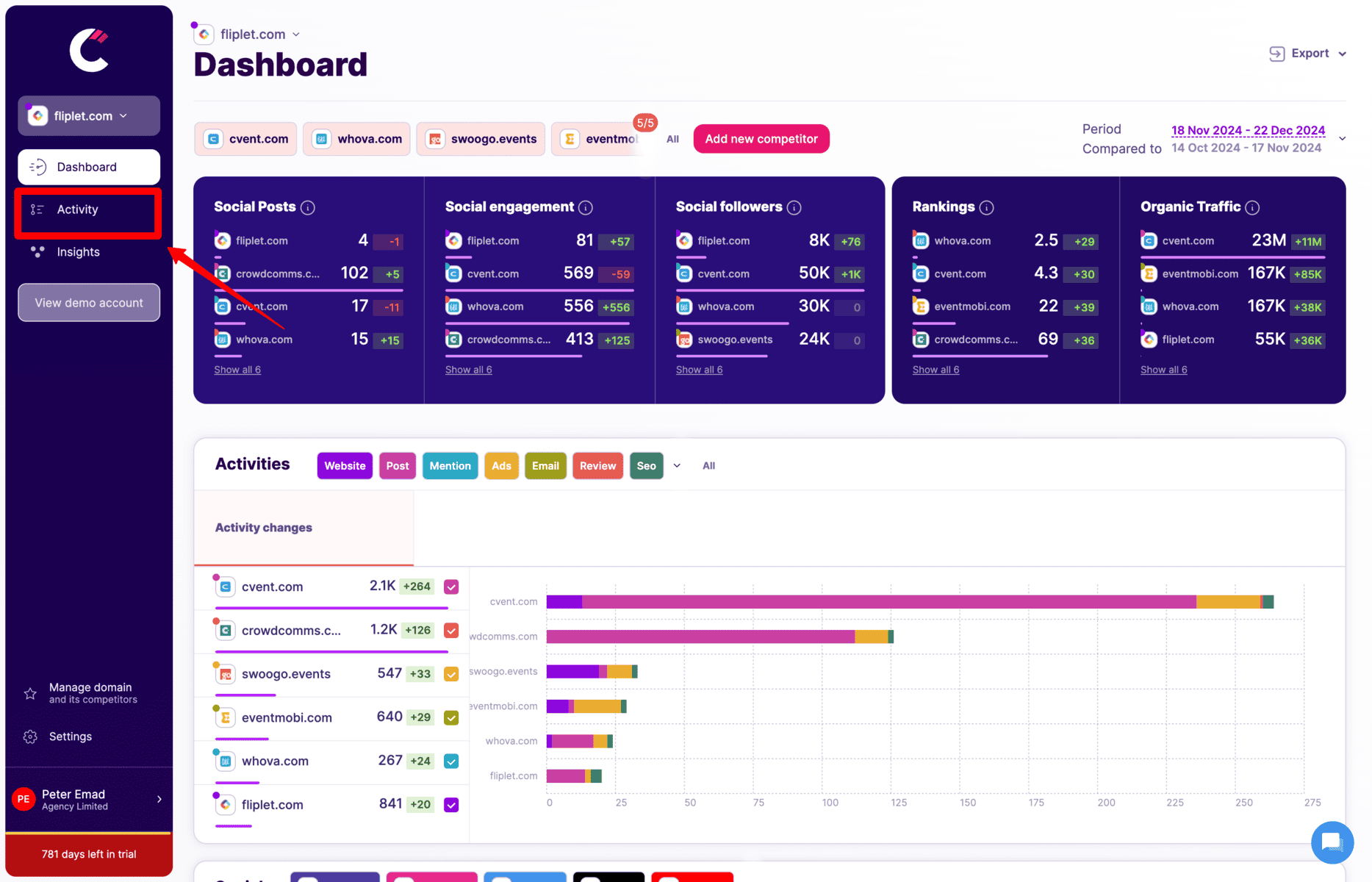
Step 3: Visit the Social Activity Timeline
In the app, navigate to the activity timeline. This feature provides a chronological view of your competitors’ social media posts along with their engagement, follower growth for each post.
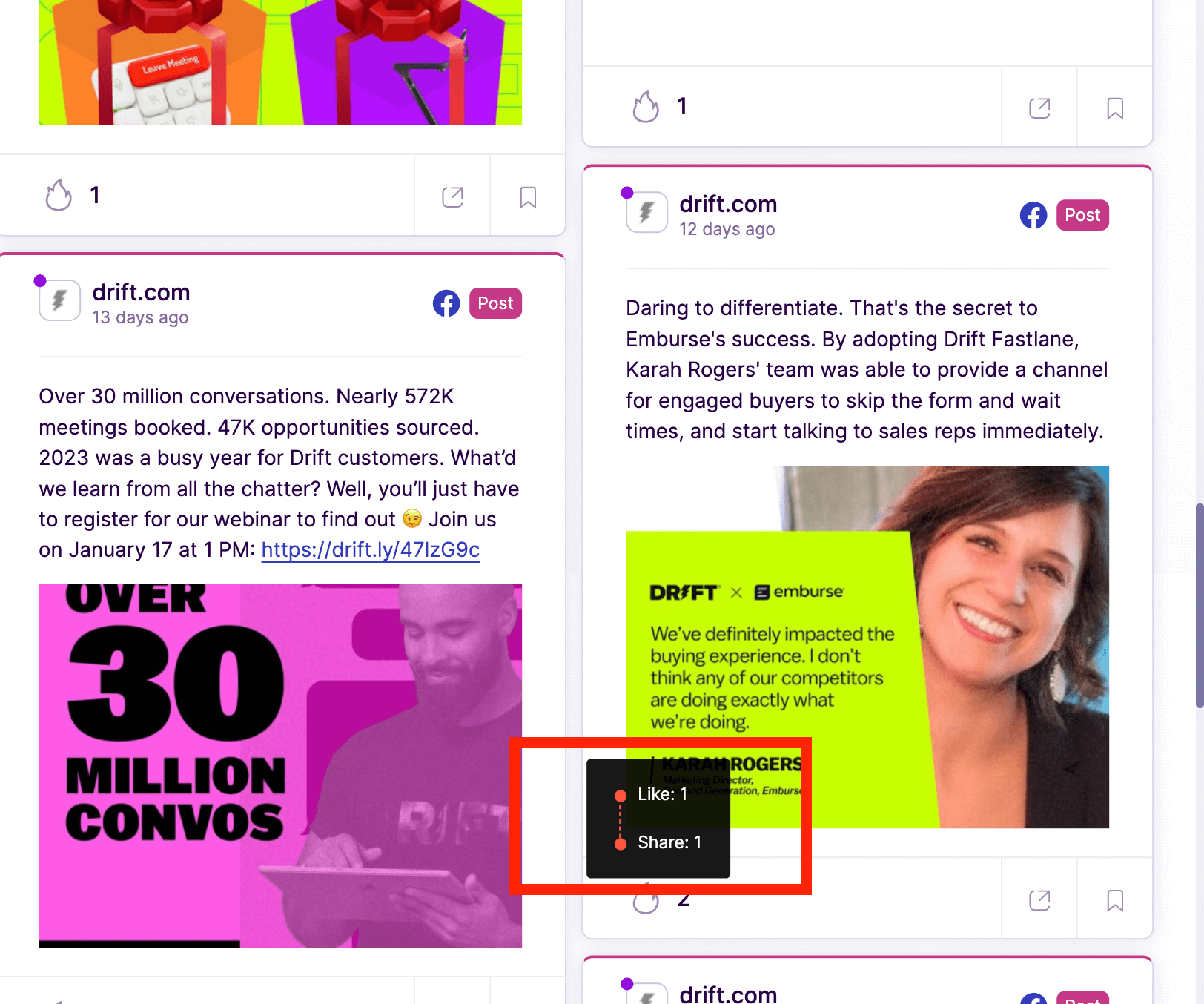
Step 4: Analyze Competitors’ Posts
Examine the content of these posts. Competitors App provides detailed metrics like engagement, likes, shares, and comments, which are crucial for understanding what types of posts are successful or not.
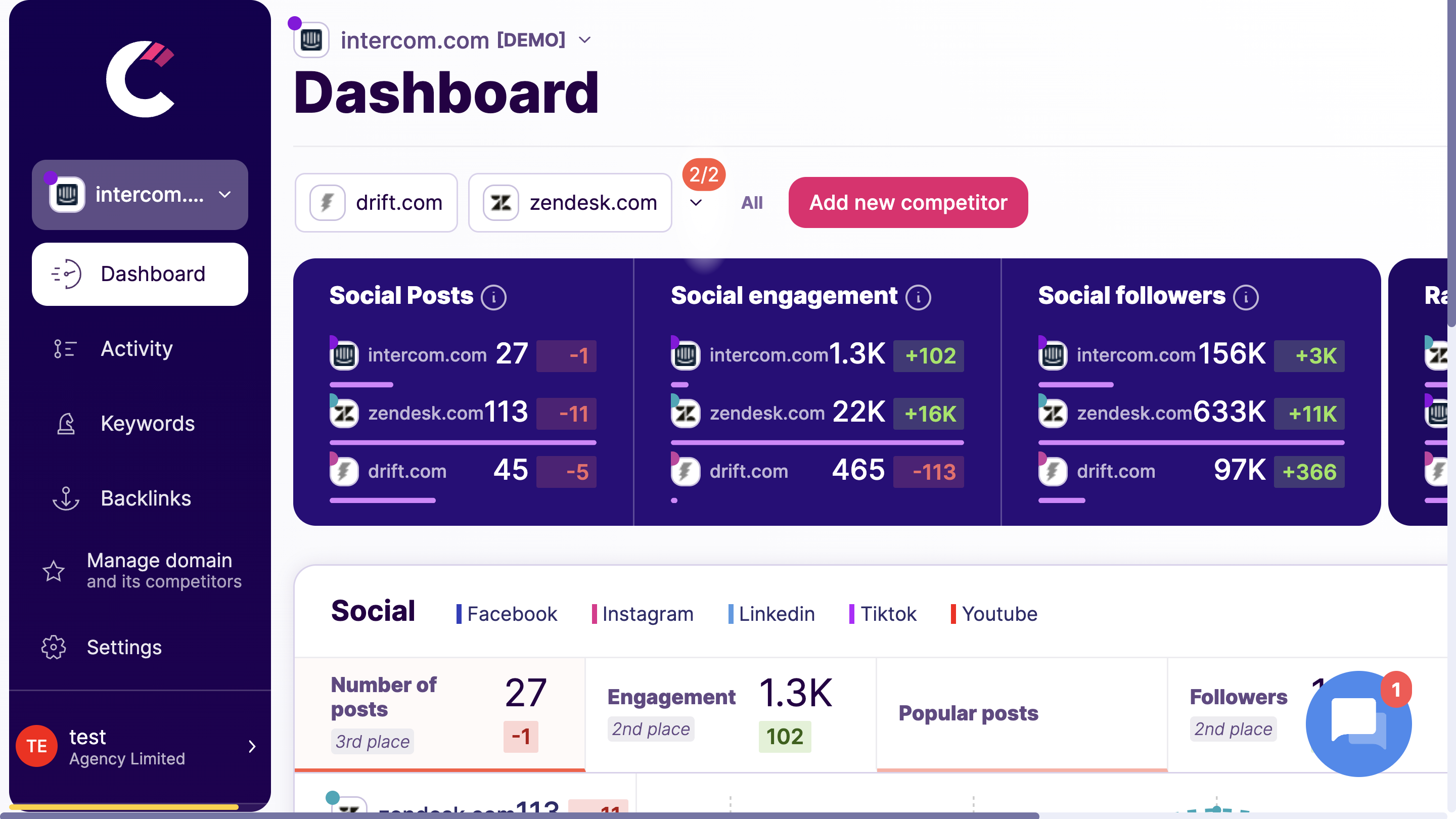
Step 5: Use the Dashboard for Advanced Social Insights
The dashboard in Competitors App offers a comprehensive view of when your competitors are receiving high levels of engagement. You can see which weeks or months they are most active and successful, giving you insights into their posting strategy.
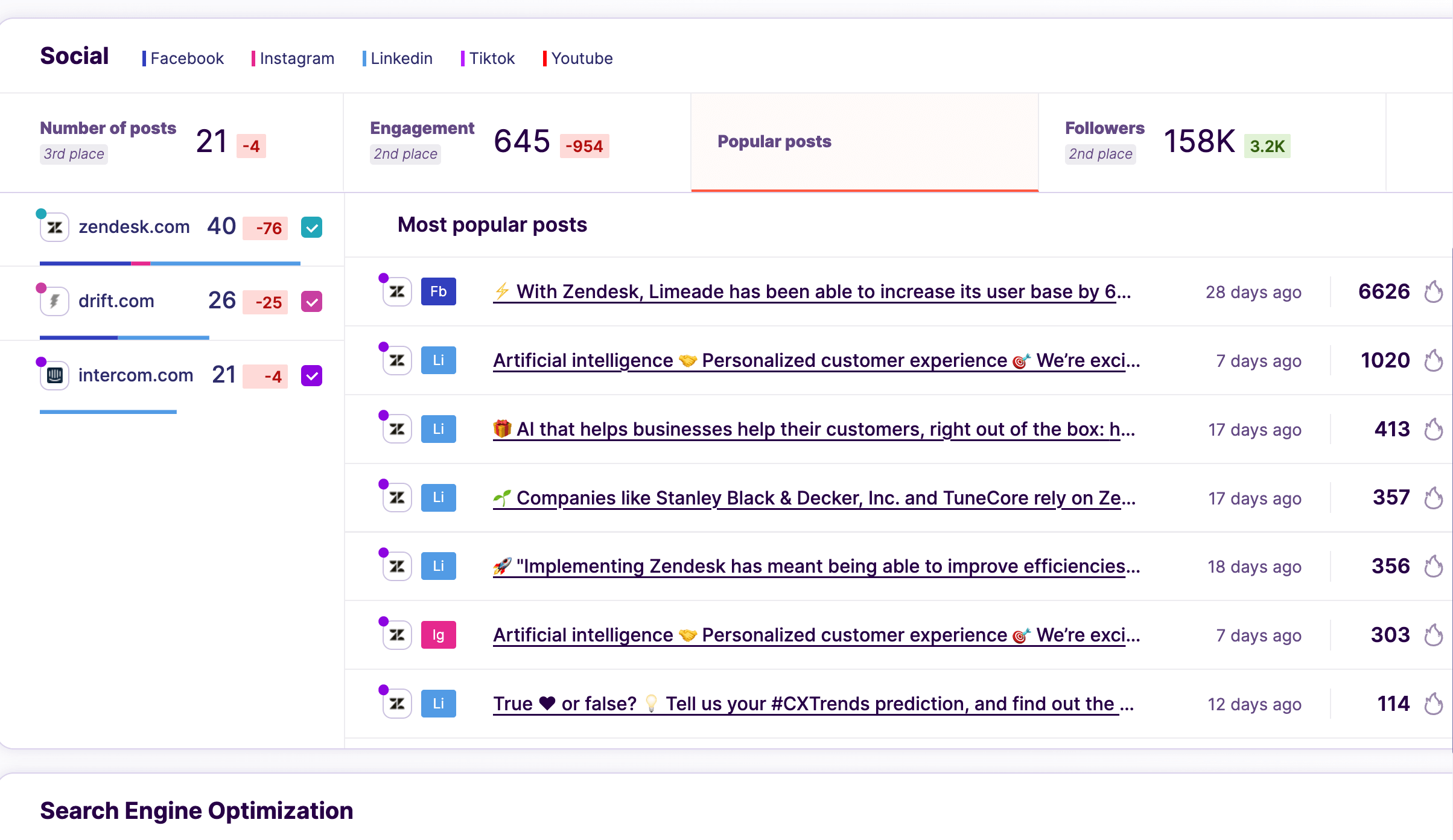
Step 6: Identify their best social media posts per channel
Through this analysis, you'll gain an understanding of which posts resonate with the audience and which don’t. This helps in shaping your content strategy.
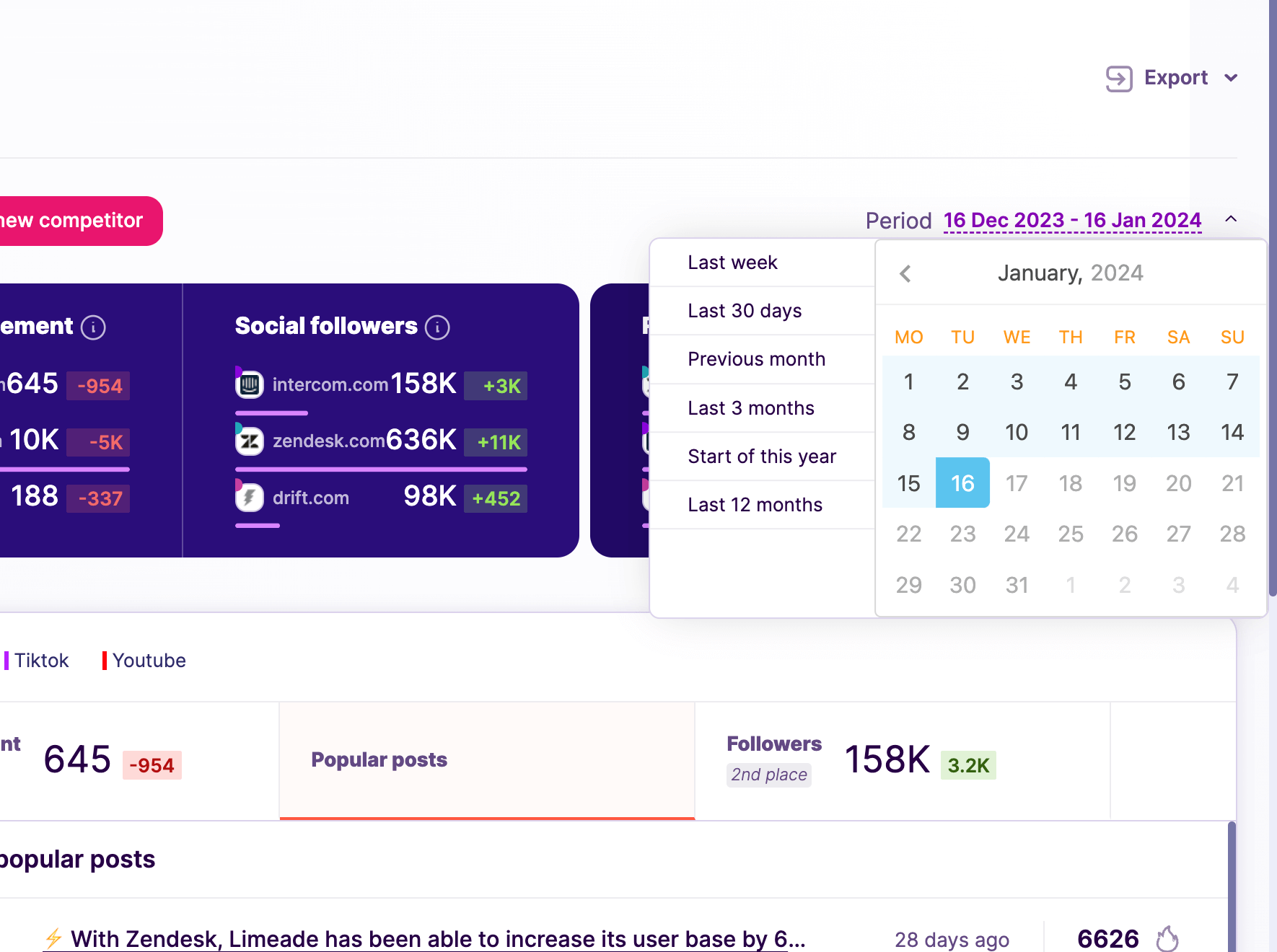
Step 7: Identify the best time and dates for posting
By observing the times when your competitors receive the most engagement, you can better plan when to release your own posts for maximum impact.
By following these steps with Competitors App, you will conduct a thorough analysis of your competitors’ social media strategies. This process not only provides insights into what works for them but also helps you refine your own approach to achieve better engagement and results.
Top TikTok Competitor Analysis Tools
Competitors App

Competitors App is a robust tool designed to provide detailed insights into competitors’ TikTok strategies, including engagement metrics, content performance, and advertising efforts. It simplifies competitor monitoring with real-time updates and reports.
Key Features:
- Tracks follower growth, engagement metrics, and trending content.
- Monitors competitors’ strategies and provides real-time updates.
- Offers customisable reports to analyse performance.
Advantages:
- Intuitive interface, easy for marketers to navigate.
- Detailed analytics for tracking audience engagement and content trends.
- Multi-competitor tracking for efficient analysis.
Disadvantages:
- Limited customisation for small businesses.
Pricing: Starts at $19/month.
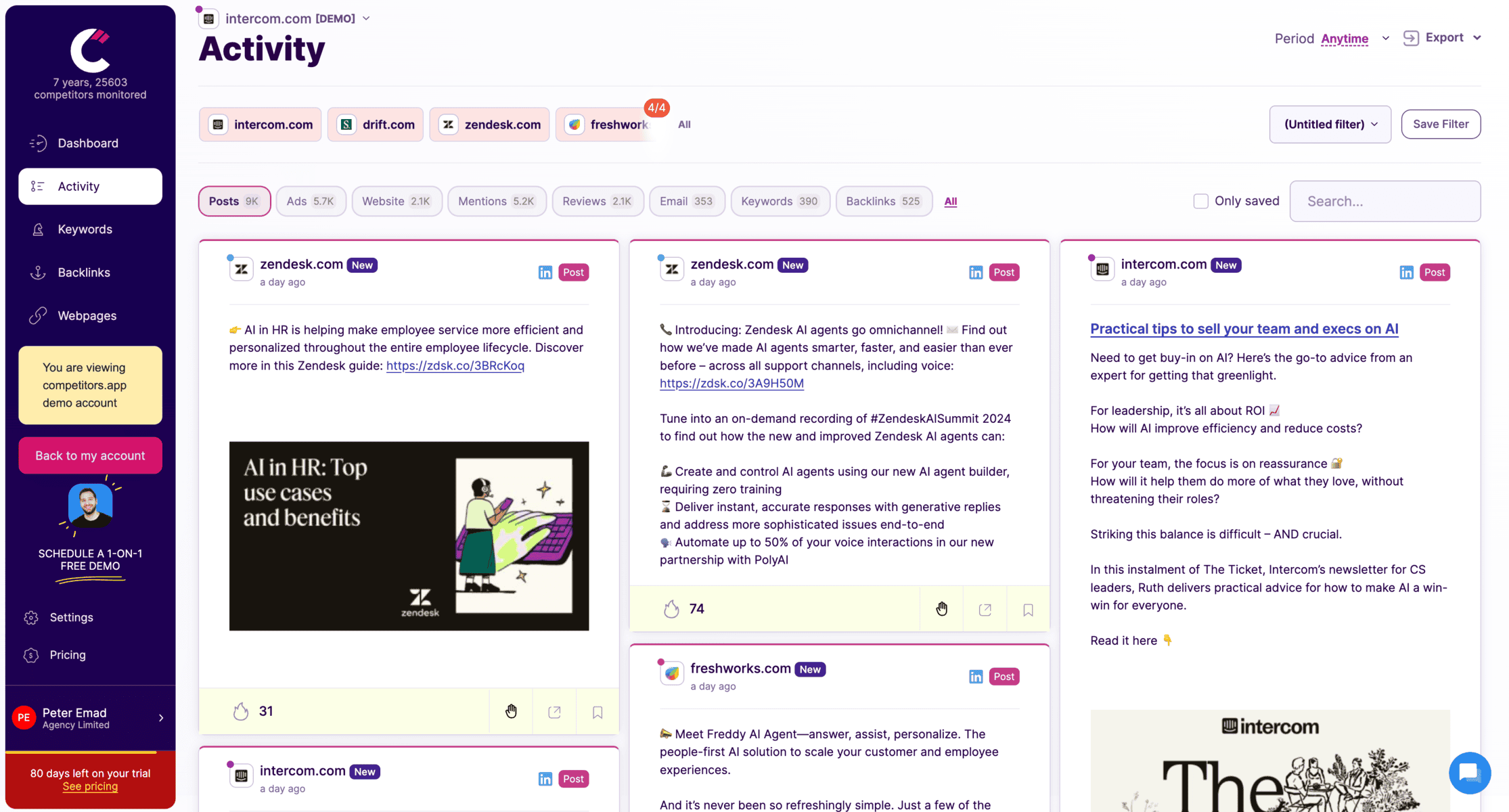
Tracks competitor social media updates across LinkedIn, Facebook, Twitter, and more.
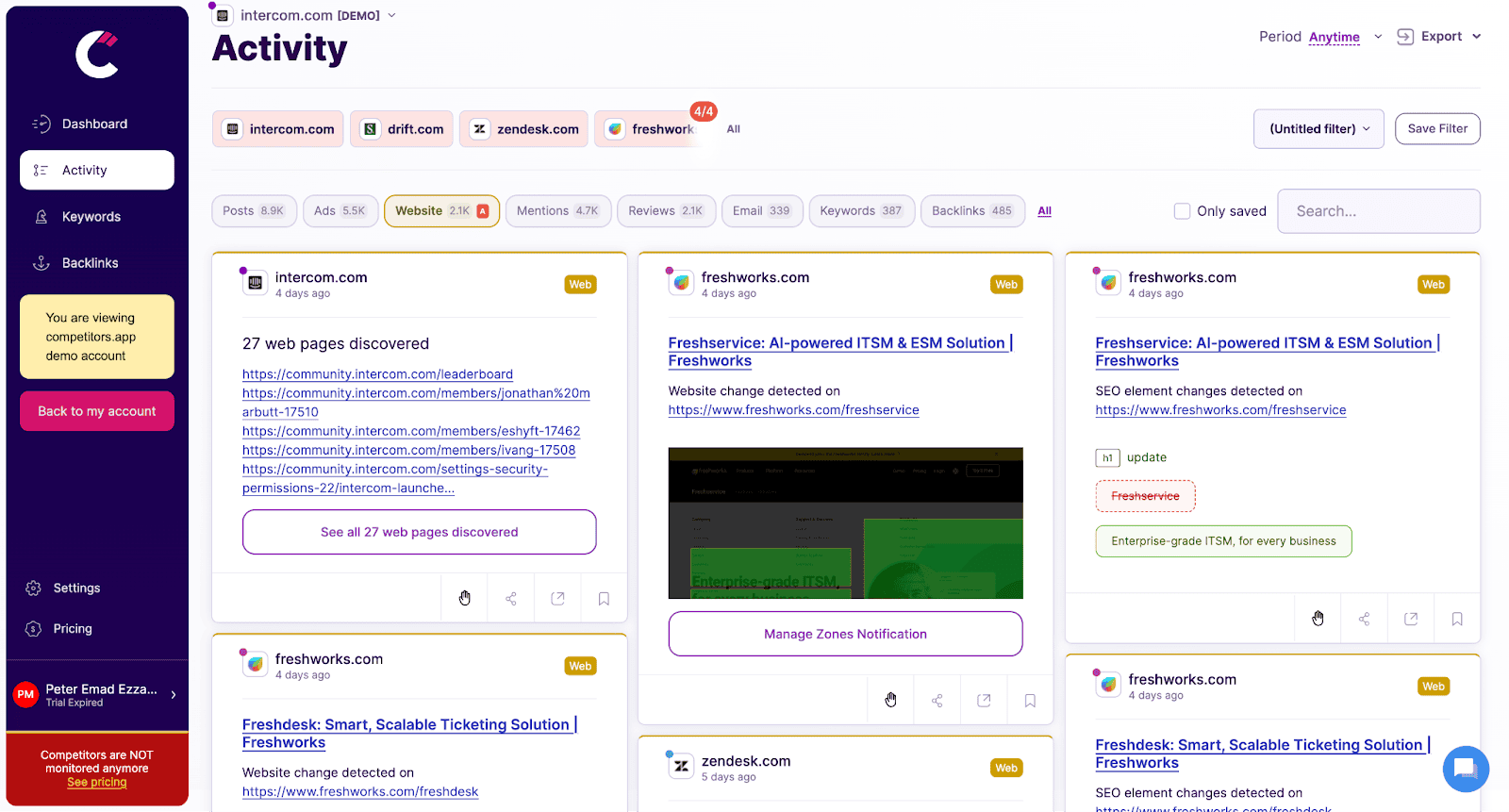
Monitors changes on competitors’ websites, such as product updates, pricing adjustments, and new messaging, providing instant alerts to help sales teams respond promptly.
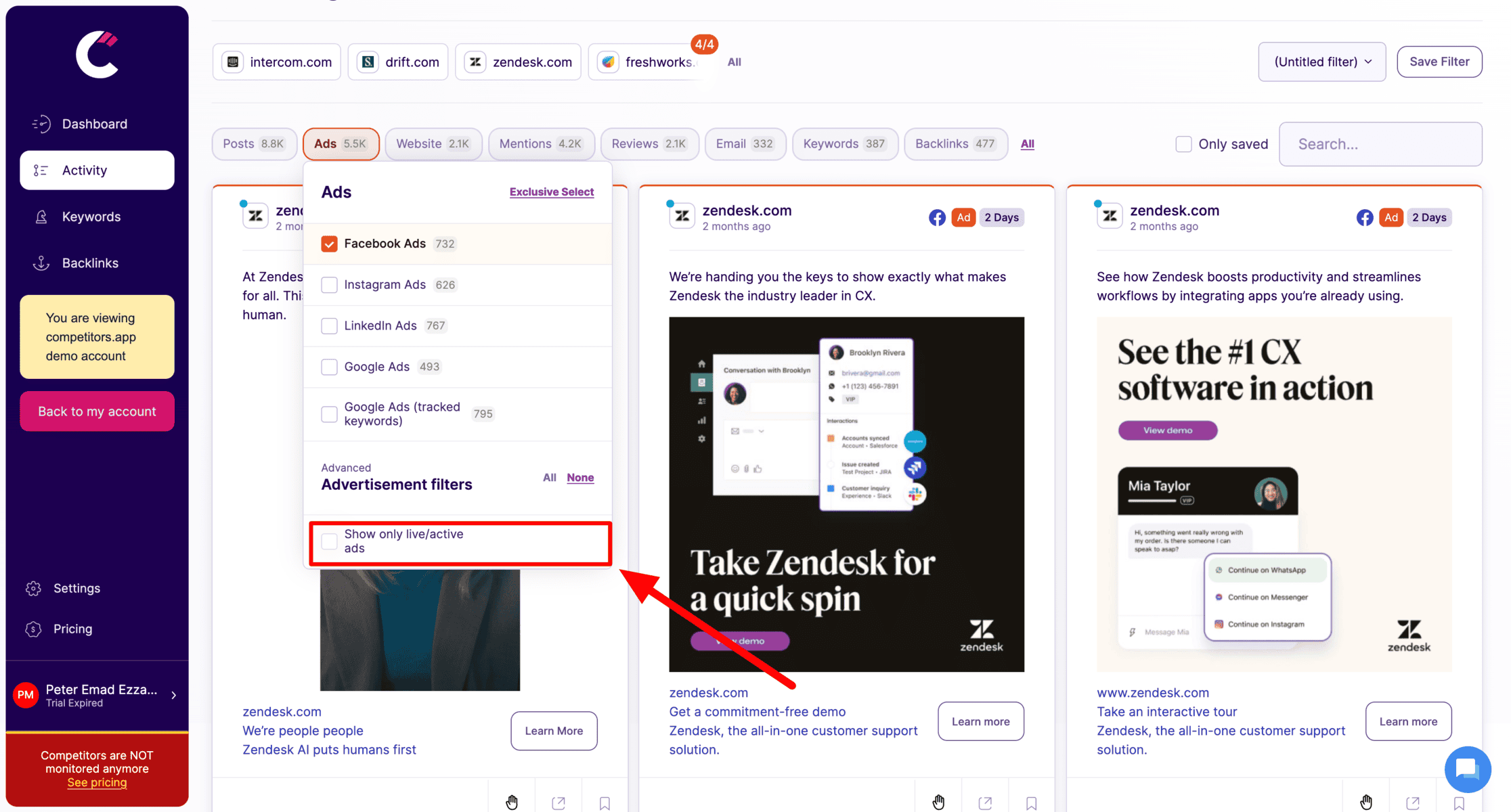
Tracks digital ad campaigns across platforms like Google Ads, Facebook, LinkedIn, and Instagram. It provides details on ad creatives, spending, and performance metrics, helping teams analyze successful ad strategies.

Analyzes competitors’ keyword strategies, organic rankings, and backlinks, allowing teams to refine their own SEO tactics and boost search visibility.
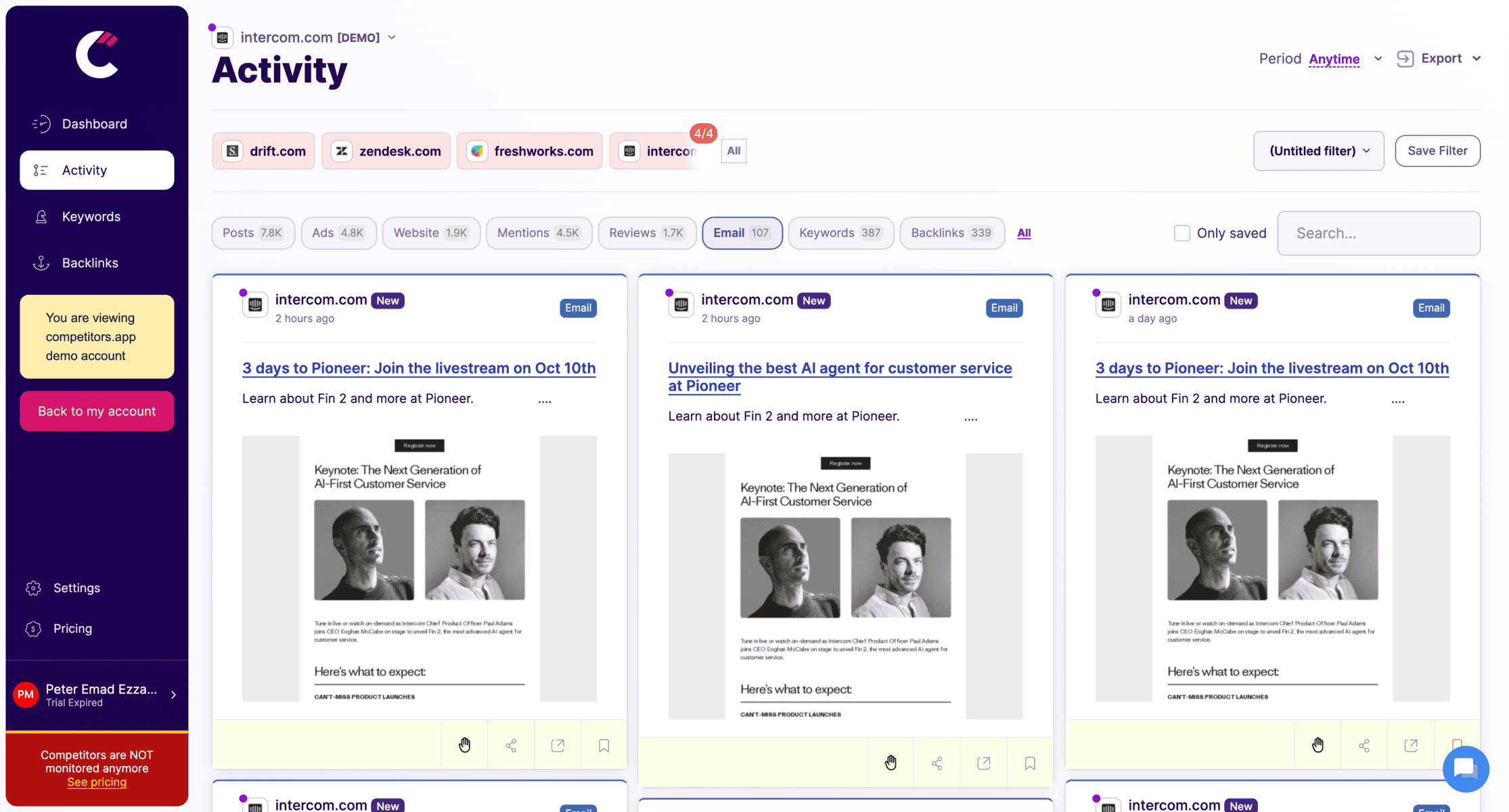
Tracks competitors’ email campaigns, including content, frequency, and engagement metrics, helping sales teams understand email tactics that drive engagement and conversions.
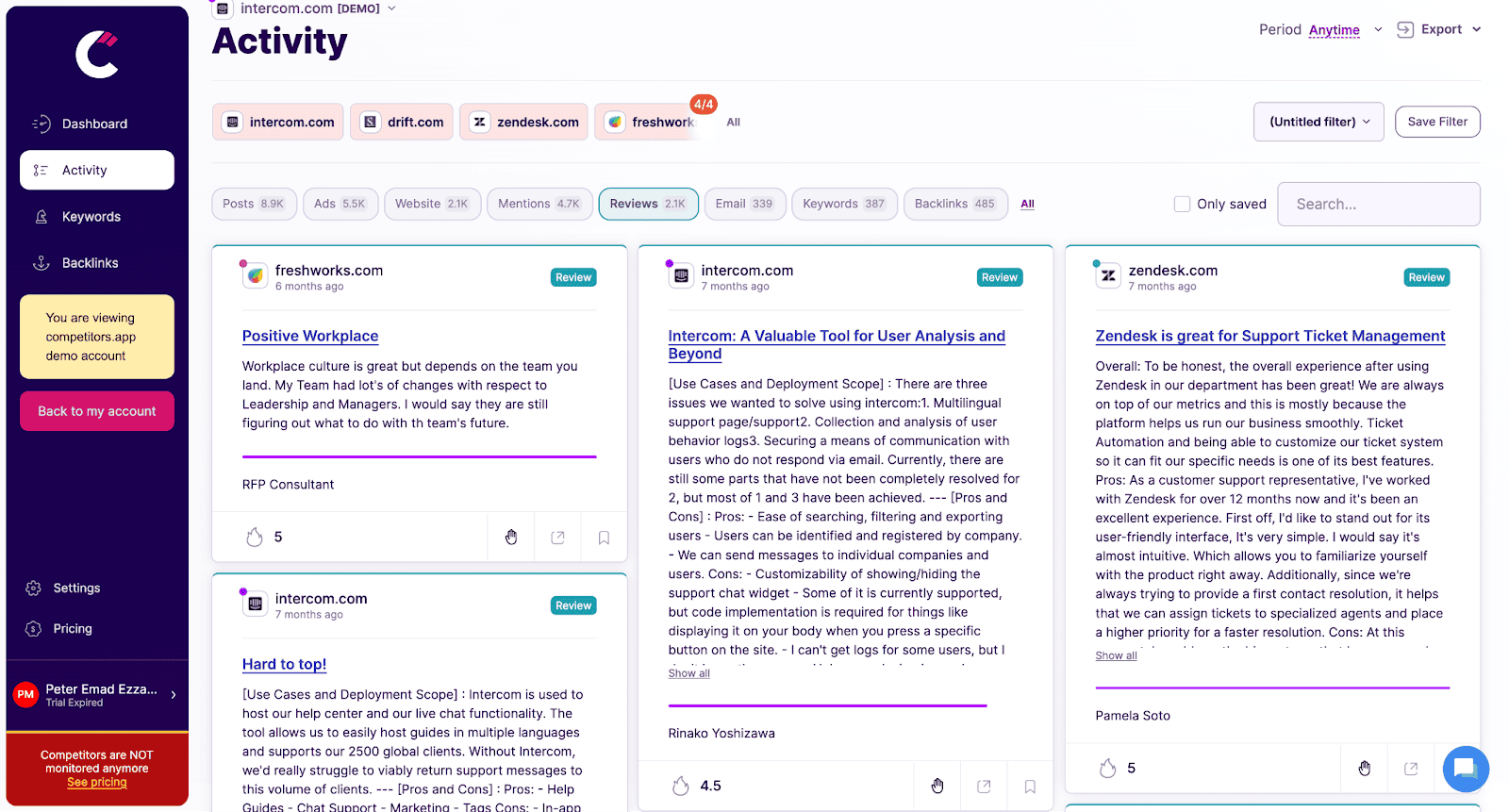
Analyzes customer reviews and ratings for competitors, providing insights into customer feedback, pain points, and product strengths, helping teams craft better sales pitches.
Exolyt
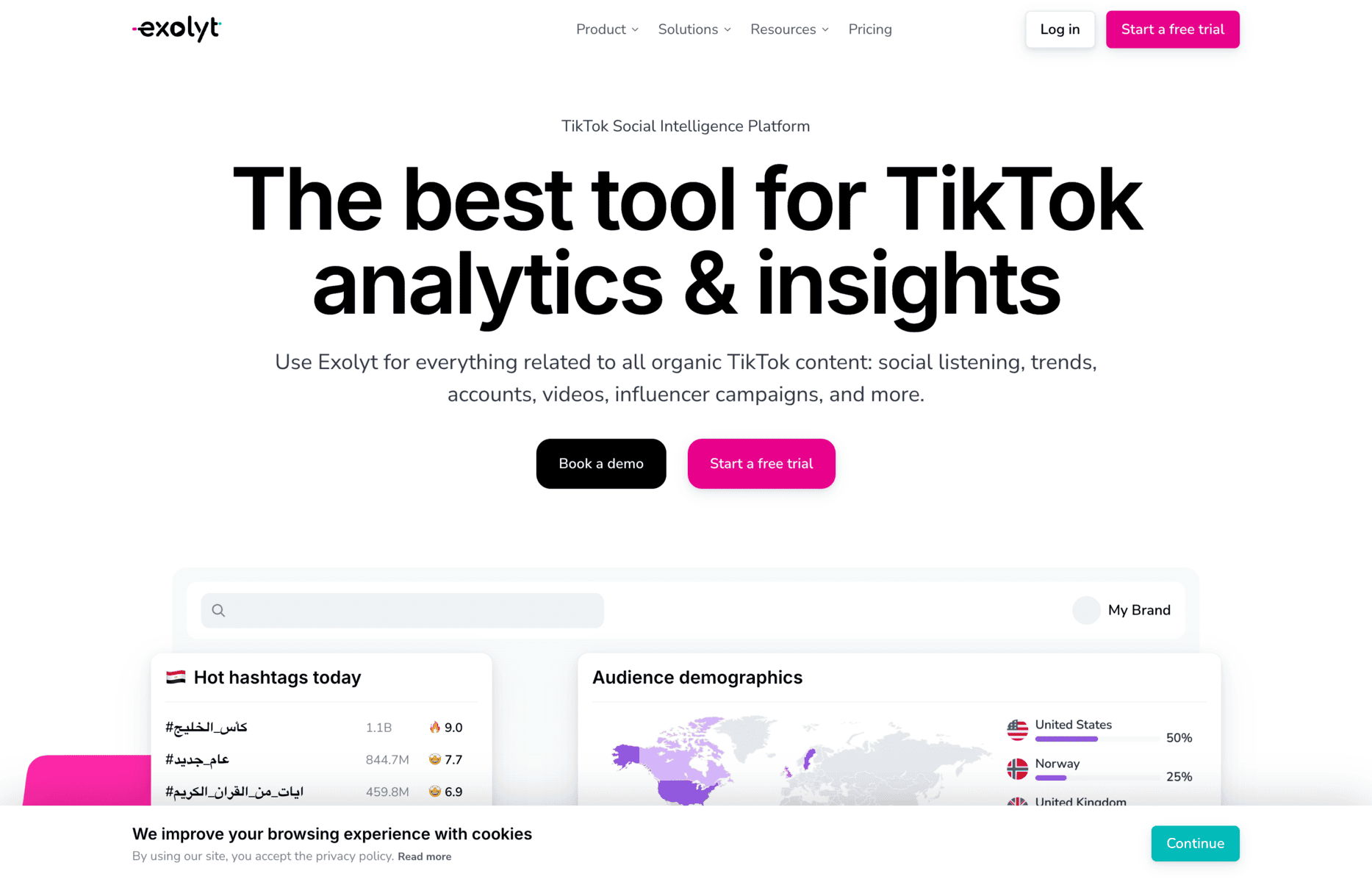
Key Features:
- Delivers insights into top-performing videos and audience demographics.
- Tracks hashtag trends and engagement metrics.
- Provides real-time analytics to monitor competitor activity.
Advantages:
- Great for analysing hashtag performance.
- User-friendly dashboard with clear data visualisation.
- Offers actionable insights for content optimisation.
Disadvantages:
- Advanced features locked behind premium tiers.
- No integration with other social media platforms.
Pricing: Free plan available, premium starts at $250/month.
TrendHero
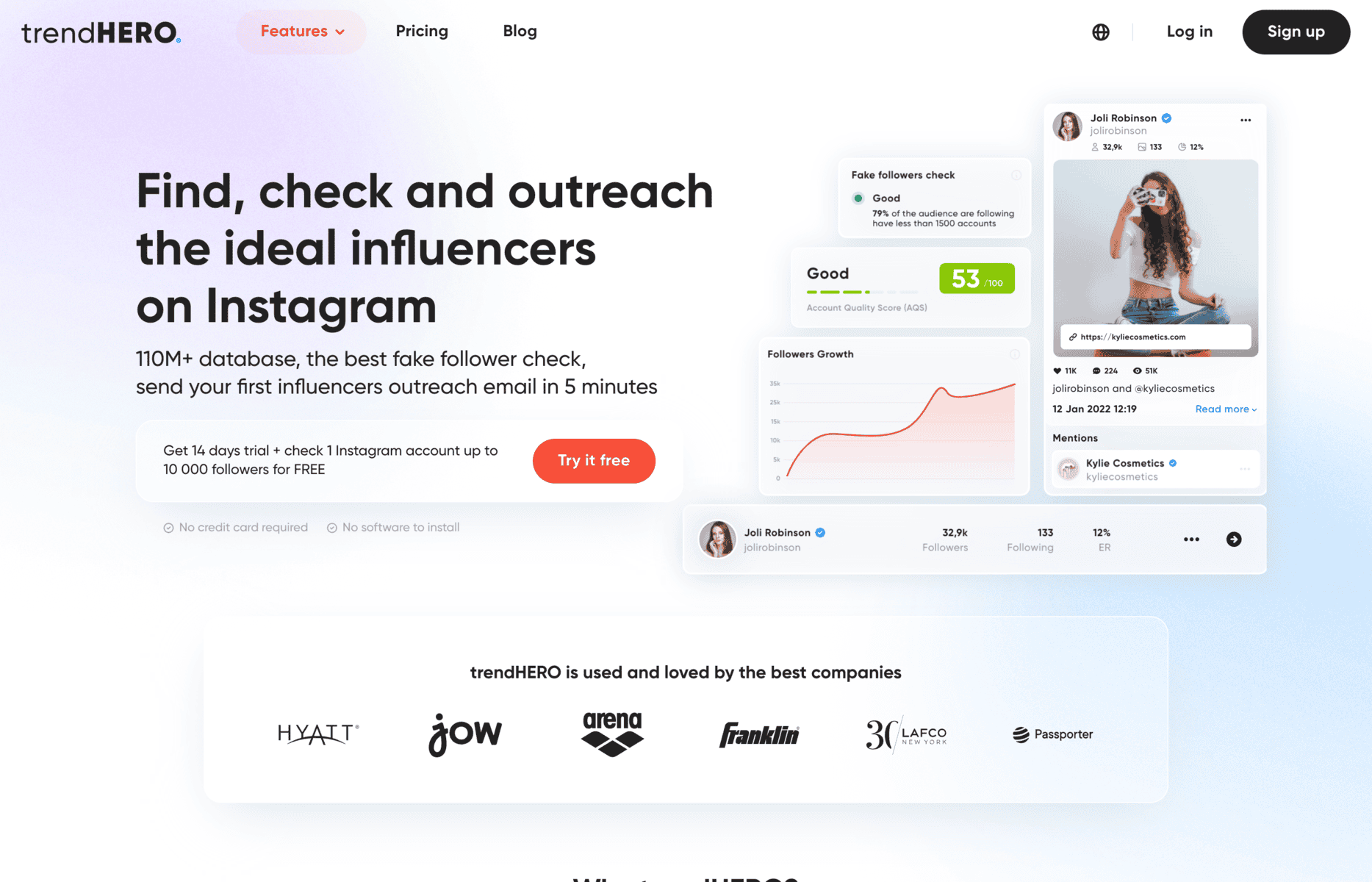
Key Features:
- Specialises in influencer analysis and engagement monitoring.
- Tracks campaign performance and audience interactions.
- Provides a database of influencers for marketing collaborations.
Advantages:
- Affordable option for beginners.
- Excellent for finding and analysing influencers.
- Simple tools for tracking campaign success.
Disadvantages:
- Limited features for comprehensive competitor analysis.
- Primarily focused on influencer marketing.
Pricing: Free plan available, premium starts at $9.99/month.
Socialinsider
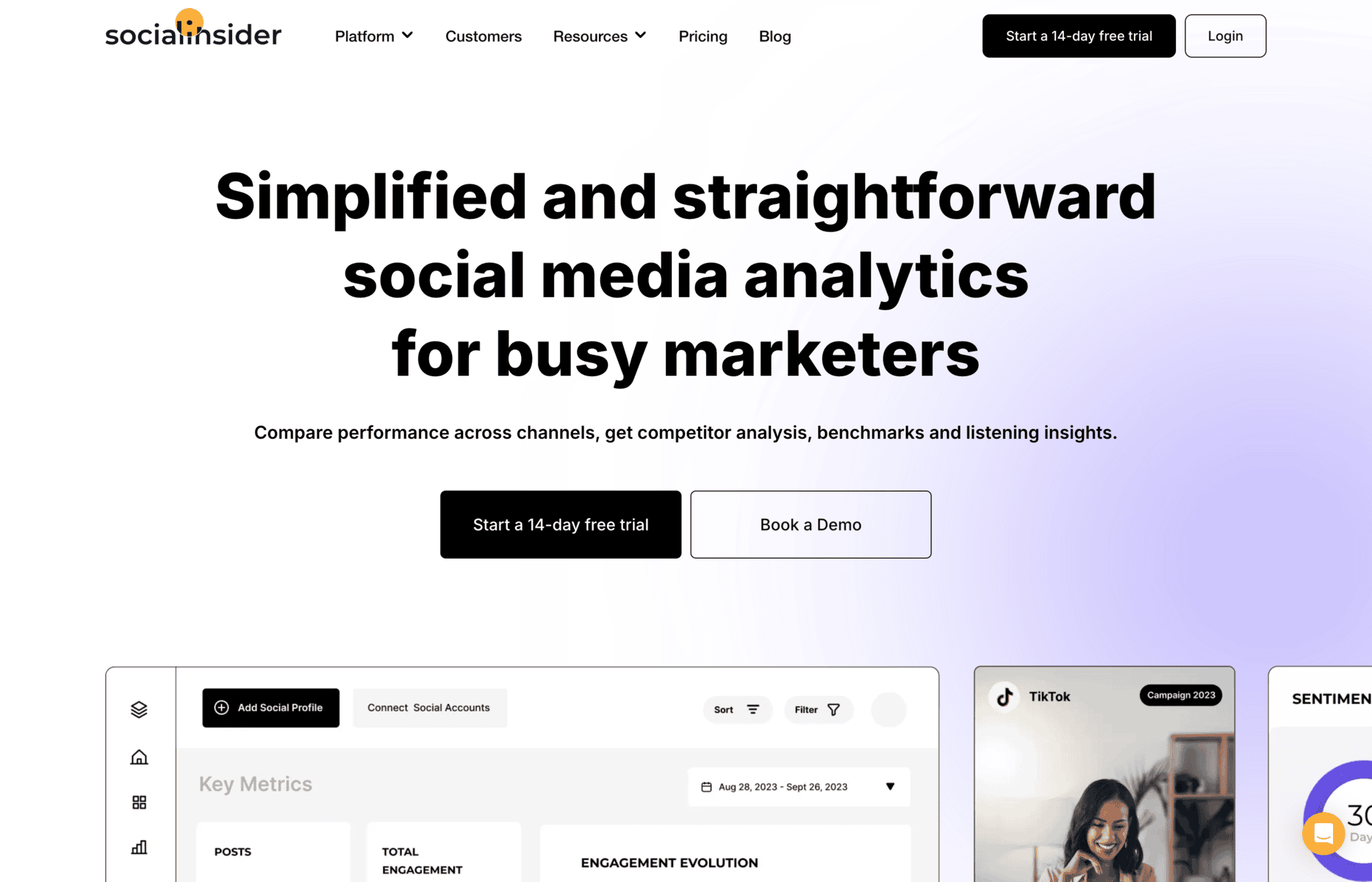
Key Features:
- Tracks TikTok engagement, audience growth, and hashtag usage.
- Provides detailed competitor benchmarking tools.
- Multi-platform analytics for holistic strategy planning.
Advantages:
- Comprehensive analytics for competitor performance.
- Robust reporting features for easy sharing.
- Supports analysis across multiple social media platforms.
Disadvantages:
- Higher pricing compared to other tools.
- Slight learning curve for beginners.
Pricing: Starts at $99/month.
Key Metrics to Track in Your TikTok Competitors
Tracking the right metrics is essential to gaining actionable insights during your TikTok competitor analysis. Here are the most important metrics to monitor:
Follower Growth
Analyse how quickly your competitors are gaining followers. This can indicate whether their content is resonating with their audience and whether they are effectively leveraging TikTok’s trends and features. A steady or rapid increase suggests a strong strategy, while stagnant growth may signal missed opportunities.
Engagement Rate (Likes, Comments, Shares)
Engagement rate is one of the clearest indicators of a competitor’s success. Divide the total engagement (likes, comments, and shares) by the number of followers to get an accurate percentage. High engagement often correlates with compelling content and active audience interaction.
Posting Frequency and Consistency
Review how often competitors post and whether they maintain a consistent schedule. Frequent, consistent posting keeps audiences engaged and helps content perform better with TikTok’s algorithm. Irregular posting may hinder growth, even for quality content.
Top-Performing Videos
Identify which of their videos have the highest engagement or went viral. These top performers can reveal what type of content resonates most with your shared audience, such as specific themes, formats, or use of trends.
Content Formats and Trends Used
Pay attention to the variety of content formats competitors use, including challenges, tutorials, or storytelling videos. Also, note how they incorporate TikTok trends and viral audio. This can inspire fresh ideas for your own content.
Hashtag Performance and Usage
Evaluate the hashtags your competitors use most often and their effectiveness. Track how many views their hashtags generate, as this can help you identify high-performing keywords to boost your content’s reach. Incorporating TikTok SEO strategies, such as optimising your hashtag use, can significantly improve your visibility on the platform.
Audience Demographics and Interactions
Observe your competitors’ audience demographics through their comment section and interactions. Look for patterns in their audience’s interests, language, and preferences. Understanding this can help you refine your targeting.
Common Mistakes to Avoid in TikTok Competitor Analysis
While TikTok competitor analysis is a powerful tool, certain mistakes can hinder its effectiveness. Avoid these common pitfalls to ensure your research yields actionable and accurate insights:
Focusing Solely on Follower Count
It’s easy to be impressed by a competitor’s large follower count, but this metric doesn’t always reflect success. Engagement rates, content performance, and audience loyalty are far more valuable indicators of a competitor’s influence.
Ignoring Content Quality
Some brands get caught up in metrics and fail to assess the quality and creativity of a competitor’s content. Understanding what makes their videos resonate—be it storytelling, trends, or visuals—is essential to refining your strategy.
Overlooking Hashtag Strategies
Competitors often use hashtags to target specific audiences and boost discoverability. Failing to evaluate which hashtags work for them can mean missing out on critical insights that could improve your reach and visibility.
Neglecting Consistency in Tracking
Competitor performance fluctuates over time. Analysing data from a single point without tracking trends over weeks or months can lead to incomplete or misleading conclusions.
Not Adjusting Strategies Based on Findings
Gathering insights is only half the battle; applying those insights effectively is crucial. Avoid the mistake of collecting data without translating it into actionable improvements for your TikTok content strategy.
Using the Wrong Tools or Manual Methods Only
Relying solely on manual methods can result in missed opportunities due to limited scope or human error. Investing in the right tools ensures you capture comprehensive, accurate data.
By avoiding these mistakes, your TikTok competitor analysis will be more focused and effective, giving you a competitive edge in the platform’s fast-paced environment.
Frequently Asked Questions
What Is the Best TikTok Competitor Analysis Tool?
The best tool depends on your needs and budget. Competitors App is ideal for brands seeking comprehensive analytics, while Exolyt excels at tracking hashtags and trends. For those focused on influencer collaborations, Analisa.io is a strong choice. Tools like Socialinsider provide multi-platform analytics, which can be beneficial for holistic strategy planning.
How Can I Perform a Competitor Analysis on TikTok?
To perform a TikTok competitor analysis, start by identifying key competitors in your niche. Track their metrics, such as follower growth, engagement rates, and posting frequency. Analyse their top-performing content and hashtags to uncover what works for them. Use this data to identify opportunities and refine your own TikTok strategy.
What Are the Key Metrics to Focus on During Competitor Analysis?
Key metrics include follower growth, engagement rate (likes, comments, shares), posting frequency, top-performing videos, hashtag performance, and audience demographics. Monitoring these metrics helps you understand what drives success on TikTok and how to replicate or improve upon it.
How can I use insights from competitor analysis to improve my strategy?
Insights from competitor analysis can guide your content creation, targeting, and advertising strategies. By understanding what works for competitors, you can replicate successful tactics and fill gaps in your own approach.
How Often Should I Conduct TikTok Competitor Analysis?
It’s recommended to conduct competitor analysis at least once a month to track trends and changes. However, monitoring real-time metrics and significant updates weekly can provide a competitive edge in TikTok’s fast-paced environment.
